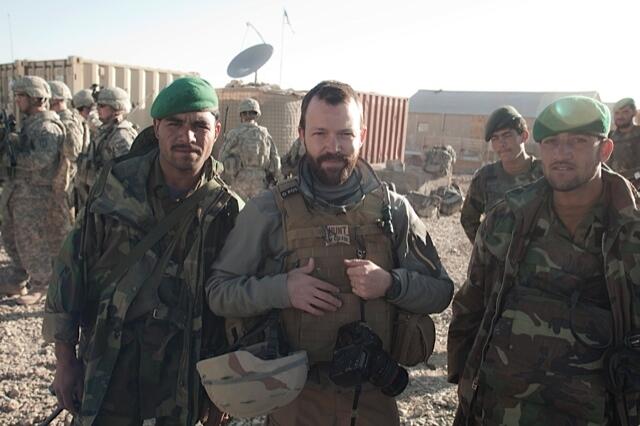
Nov. 1, 2013
'Ghosting Home' exhibit displays Afghanistan photos
Share this story
| Hunt's photographs will be on display on the first floor (southside) of Cabell Library, Nov. 1-15. Student Media, Broad Street Magazine, OMSA and Military Student Services are co-sponsoring the exhibition. For more information, visit http://www.library.vcu.edu/blog/news/2013/10/art-of-war.html |
Chad Hunt always wanted to serve in the military, but his father, a Vietnam veteran, actively prevented him from joining. When recruiters called, Hunt's father answered the phone and convinced them not to enlist his son.
But if his father's plan was to keep Hunt out of danger, it backfired.
Instead of joining the military, Hunt, a Virginia Commonwealth University alumnus, became a celebrated photographer, freelancing for magazines such as Men’s Journal, Popular Mechanics, Gourmet and Time, the latter of which featured his work on the cover. In turn, his status as a freelance photographer afforded him the rare opportunity to travel to the middle of a war zone as an embedded photographer with soldiers in Afghanistan.
Hunt purchased his own equipment — including body armor — and a plane ticket to the decade-long war zone. Once there, he witnessed firefights, searched for bomb makers with recon scouts, armed landmines and slept next to machine guns.
His father, to say the least, would not have been pleased.
Undeterred, Hunt soldiered on, capturing commanding images of soldiers during their deployments and after their discharge from the military. The James Branch Cabell Library presents these photographs Nov. 1-15. The exhibition, "Ghosting Home: Soldiers in and out of Afghanistan,"shows how combat veterans can blend in with the public, although their war experiences linger with them.
“Many of these guys were just ‘ghosting’ back into the civilian world,” Hunt said. “You never know what they have seen or done. One guy might now work at Target [who] ripped apart someone with a machine gun.”
Hunt does not label himself as a war photographer. Rather, the majority of his photographs show the lifestyle of troops while deployed. He wanted to portray more of the soldiers “living in the sticks” and less of them kicking down doors.
“It doesn’t matter what your political beliefs are,” he said. “Being out there gives you [some] perspective.”
Hunt has since returned to Afghanistan twice, as well as visiting various outposts such as Korengal Valley, where the documentary “Rastrepo” was filmed, and Combat Outpost Keating, based on the nonfiction book “The Outpost.”
While he never officially joined the military, Hunt feels he has created a special bond with the soldiers he's lived with and photographed.
Subscribe for free to the weekly VCU News email newsletter at http://newsletter.news.vcu.
Subscribe to VCU News
Subscribe to VCU News at newsletter.vcu.edu and receive a selection of stories, videos, photos, news clips and event listings in your inbox.







